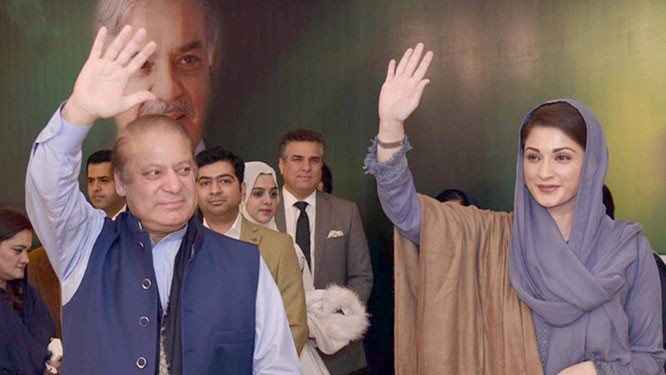
The tenuous relationship between Nawaz Sharif and ‘invisible forces’

Nawaz Sharif and some of his acolytes (his daughter too) have been quite vociferous in vilifying what they call ‘invisible forces’ (Khalai Makhluq). With all machinations at their command, these ‘forces’ supposedly work in contravention to the ‘interests’ and the ‘betterment’ of the people, they say. They undermine the schemas the popularly elected government sets for itself to improve the lot of the electorate. In general terms, sthe invisible forces can also be described as the establishment.
Likewise, a usual perception entertained by the liberal sections of society about the ‘establishment’ is of something antithetical to the sustenance of democratic forces.
The convergence of opinion among these two sections is, indeed, interesting. It is ironical that Sharif and his coterie, who built their respective careers representing the politics of ultra-right, are voicing the same concerns as the liberal classes who carry the tag of anti-Pakistan; the two being ideologically poles apart until quite recently.
Politics as an art of the possible tends to draw strangest entities together.
Who could have imagined until a few years ago Nawaz Sharif and the liberal intelligentsia employing the same idiom? The recently found unanimity between the two is embedded in their aversion to the ‘establishment’; for them it is a cornucopia of all ills besetting the country.
The tenuous relationship between the Sharif-liberal intelligentsia and pro-establishment analysts needs a dispassionate scrutiny, which is the core theme of today’s column. What is ‘establishment’, whom does it represent and whether it has any worth with respect to Pakistani politics and governance. Does it work squarely to impede the evolution of the state institutions or does it temper and tone down the grandiose schemes and ideas, the political leaders are at times smitten with, are worth exploring questions.
Some of these questions are taken up in the lines to follow.
Dictionary defines establishment as "a dominant group that holds and exercises power or authority in a nation or organization". It is described as "the cooperative federation of the powerful military oligarchy". In the particular case of Pakistan, high-ranking civil servants and military officers are said to constitute establishment. The senior members of judiciary, important financiers and industrialists, and media moguls are also its part.
The establishment in Pakistan arrogates to itself the key and elite decision-making regarding country’s public policy, "ranging from the use of intelligence services, national security, foreign and domestic policies".
The coinage of the term ‘establishment’ was erroneously attributed to British Journalist Henry Fairlie. Afterwards, it was said that Ralph Waldo Emerson used that term for the first time in 1891 while some credit Professor Carroll Quigley of Georgetown University for devising that concept.
All that one can gather from this information is that ‘establishment’ is a modern concept. However, as an institutionalised practice, the presence of the ‘establishment’ could be observed since antiquity. Since the very dawn of human society, there had to be a sustained pattern of governance as well as security, howsoever simplistic and facile it might have been. How to govern and how to ensure security are the two constants which have always been at the heart of the human endeavour, aiming towards the building of human society or subsequently the (modern) state.
The same holds for medieval ages when human society and state underwent various stages of evolution. Two illustrations from Indian history would help us in elucidating the point. Despite all the power and pelf enjoyed by an influential and strong king from the Slave dynasty as Ghiasud Din Balban, he was helped to ensconce on the throne by the establishment that existed at that time by the name of Umra-i-Chahalgani or The Forty.
Similarly, Nur ud Din Jehangir, the fourth Mughal emperor, found his way to the throne only after he had mustered support from various influential quarters, operating in the royal palace. Obviously, it was the ‘establishment’ of that time that had worked decisively in favour of Jehangir. Otherwise, his son Khusrao was the preferred choice of the great Mughal King Jalal ud Din Akbar.
However, the ‘establishment’ of those times lacked present-day sophistication. The number of stakeholders in the establishment has gone up. Besides, the operational side of the establishment has become quite complex particularly with the emergence of the modern state system. The advent of bureaucracy and the importance that corporate sector has come to acquire lent further complexity to the nitty-gritty of what we call establishment.
Another dimension has been the striking of equilibrium between the aims and objectives of the government which is liable to change after every few years or even earlier than that and the longue duree interests of the state. The problem arises when the government and establishment fail to strike such an equilibrium. That is the real dilemma that Pakistan is facing for some time. One does not generally see both of them on the same page. Negotiation between the two is conspicuously non-existent. Consequently, the governments usually remain unstable and are locked out of the affairs of the security and the foreign policy.
The ‘establishment’ on the other hand nurses concerns about the seriousness as well as the requisite capacity of the political governments to deal with such affairs which it thinks requires profounder insights and expertise. The political government must equip itself with the necessary tools which may come in handy to forge meaningful relationship with the establishment. The establishment can only be reformed, sensitised to the needs of the people at large and evolved only by working out a strategy of serious engagement with it. Unfortunately, Nawaz Sharif opted to do quite otherwise. The outcome was obvious, the dénouement of his political career.
The writer is Professor of History at GC University Lahore.